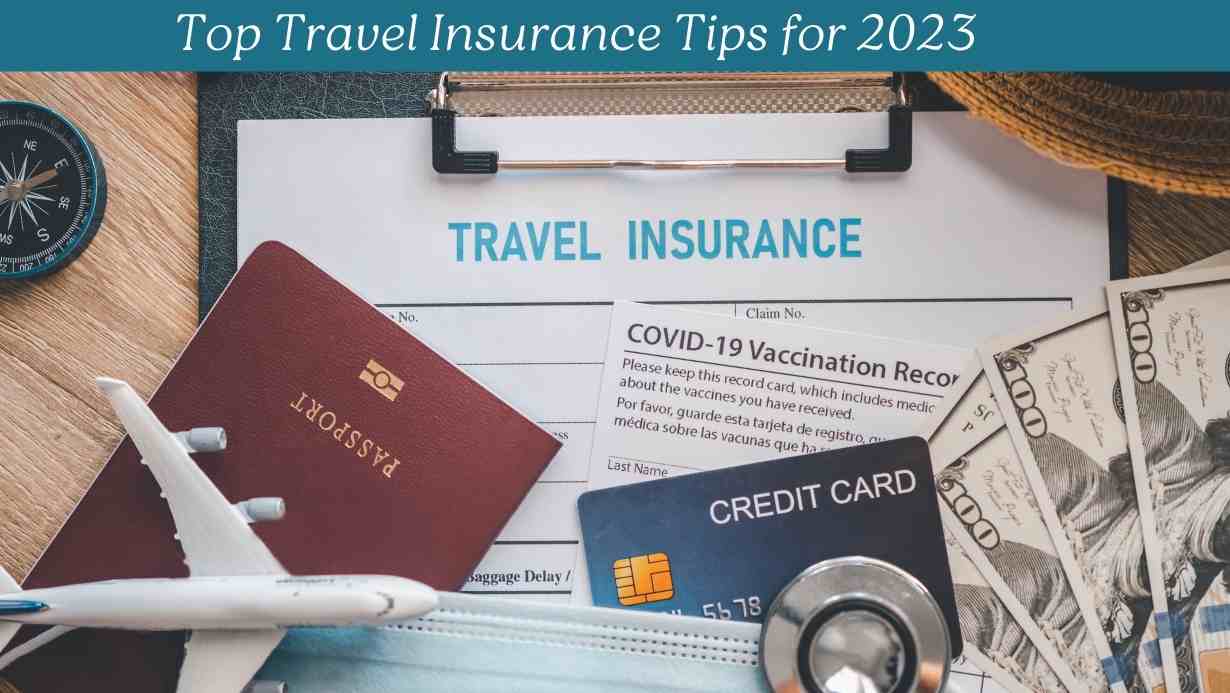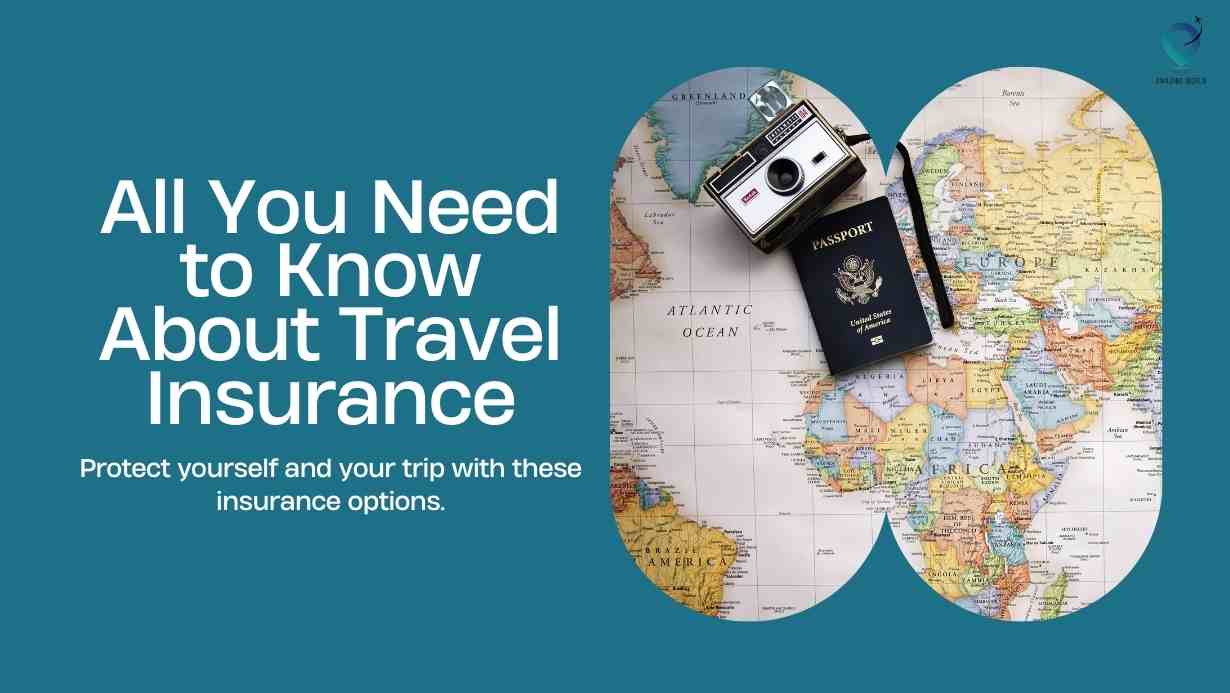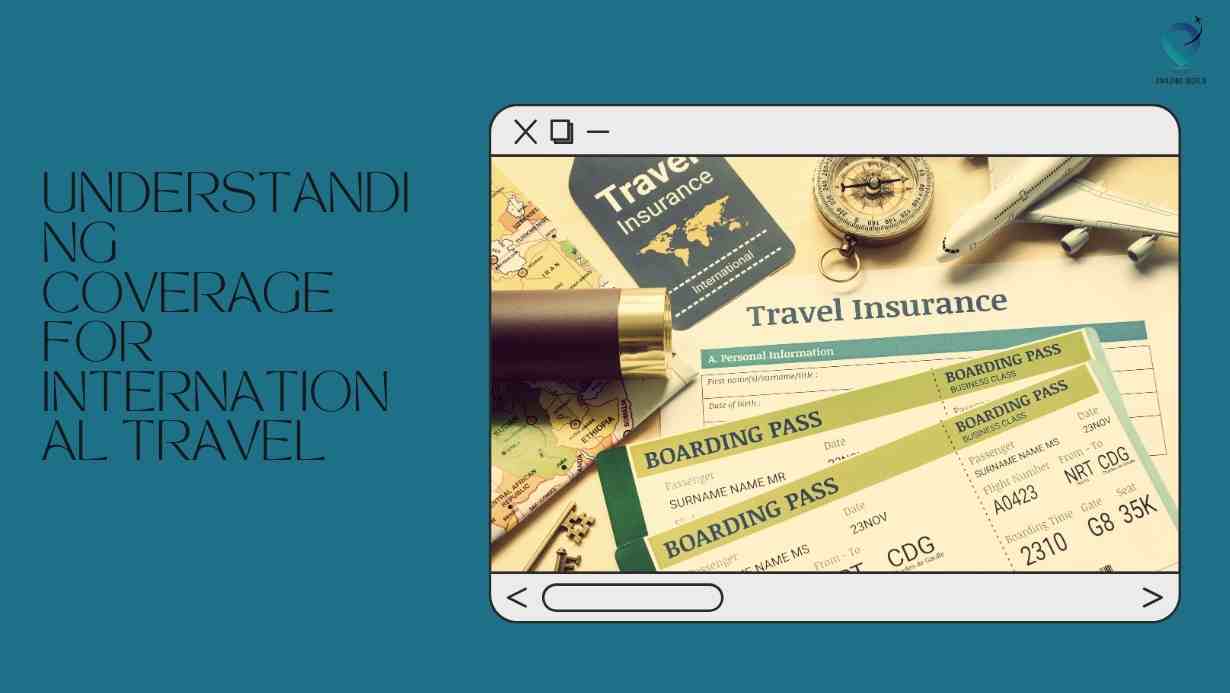Best Tips to Procure the Best Travel Insurance Plan
Are you planning a trip and wondering how to protect yourself and your loved ones while traveling? In this comprehensive guide, we’ll delve into the world of travel insurance, explaining its key components and helping you understand the crucial decision-making process. We’ll explore travel medical insurance, cancellation and interruption coverage, baggage protection, emergency assistance, and much more.
Whether you’re a globetrotter seeking adventure or a vacationer planning a leisurely getaway, our goal is to simplify the often complex world of travel insurance in plain, user-friendly language. So, if you’re ready to embark on a journey to discover how to stay safe, secure, and worry-free while exploring the world, let’s dive right in and get started.
What is Travel Insurance?
Travel insurance is a type of coverage that provides financial protection for travelers in case unexpected events or issues arise during their trip. It typically includes benefits such as reimbursement for trip cancellations, coverage for medical emergencies while traveling, protection for lost or damaged luggage, and other specific benefits depending on the policy. Travel insurance is designed to offer peace of mind and financial support in case of unforeseen circumstances during your journey, such as trip interruptions, illness, accidents, or travel delays.
Different Types of Travel Insurance
Travel insurance comes in various types, each designed to address specific aspects of your trip. Understanding the different types can help you choose the right coverage for your needs. Here’s a detailed look at each of these types:
1. Travel Medical Insurance
Travel Medical Insurance is crucial for protecting your health while traveling abroad. It covers the cost of medical treatment in case you become ill or injured during your trip. Here’s why it’s essential:
- International Health Coverage: When you’re in a foreign country, your regular health insurance may not be valid. Travel medical insurance ensures you receive medical care without worrying about the costs.
- Emergency Medical Expenses: This insurance typically covers doctor visits, hospital stays, prescription medications, and emergency dental care.
- Medical Evacuation: In severe cases, when local medical facilities cannot provide adequate treatment, travel medical insurance can arrange and cover the cost of medical evacuation to your home country or a better-equipped facility.
- Repatriation: In unfortunate situations where you pass away while abroad, this insurance can assist with the repatriation of your remains to your home country.
- Coverage for Pre-Existing Conditions: Some policies offer coverage for pre-existing medical conditions, although there may be waiting periods and other conditions.
2. Trip Cancellation and Interruption Insurance
Trip Cancellation and Interruption Insurance safeguards your financial investment in your trip. It helps when your travel plans are disrupted for various reasons:
- Cancellations: If you need to cancel your trip before departure due to unforeseen events like illness, injury, or family emergencies, this insurance can reimburse you for non-refundable expenses such as airline tickets, hotel reservations, and tour bookings.
- Interruptions: If your trip gets cut short due to unexpected events, like a family emergency or adverse weather conditions, this insurance can cover the unused portion of your trip, including additional expenses incurred.
- Coverage for Specific Reasons: Policies may vary, but common covered reasons include illness, injury, death in the family, natural disasters, and certain work-related issues. Be sure to check your policy for a list of covered reasons.
3. Baggage and Personal Belongings Insurance
Baggage and Personal Belongings Insurance is your safety net for lost, stolen, or damaged luggage and personal items during your travels:
- Lost or Stolen Luggage: If your luggage goes missing or is stolen during your trip, this insurance can cover the cost of replacing your belongings, helping you continue your journey without major disruptions.
- Delayed Baggage: It can also provide compensation for essential items you need to buy in case your baggage is delayed for an extended period.
- Coverage Limits: Policies often have limits on the amount they will pay per item or per claim, so it’s important to know the terms of your coverage.
4. Emergency Medical Assistance, Evacuation, and Repatriation
This type of insurance focuses on ensuring you receive the necessary medical care and assistance during emergencies:
- Emergency Assistance: You can access 24/7 support to help you find suitable medical facilities, coordinate medical evacuations, and provide translation services in foreign countries.
- Medical Evacuation: In critical situations, when local medical facilities cannot adequately treat you, this insurance covers the cost of evacuation to a better-equipped facility.
- Repatriation: If the worst should happen and you pass away abroad, this insurance can arrange and cover the cost of repatriating your remains to your home country.
5. Rental Car Coverage
Rental Car Coverage is specifically designed for rental car accidents and other incidents while driving during your trip:
- Collision Damage Waiver: It typically covers damage to the rental car due to a collision. This can save you from having to purchase the rental company’s expensive collision damage waiver.
- Liability Insurance: Provides coverage for injuries or property damage to third parties in case of an accident with your rental car.
- Personal Accident Insurance: Covers medical expenses for you and your passengers in the event of an accident.
6. Accidental Death and Dismemberment Insurance
Accidental Death and Dismemberment Insurance provides financial protection for you and your loved ones in case of severe injuries or death during your trip:
- Dismemberment: If you suffer the loss of a limb or a severe injury while traveling, this insurance provides compensation.
- Accidental Death: In the unfortunate event of your accidental death during the trip, your beneficiaries receive a payout.
- 24/7 Coverage: This insurance is active throughout your trip, providing you and your family with peace of mind.
travel insurance is a valuable investment, and the type of coverage you choose should align with your specific travel needs and circumstances. Whether it’s protecting your health, your belongings, your trip expenses, or providing assistance during emergencies, travel insurance offers essential safeguards for travelers.
Single Trip vs. Long-term Policies
Travel insurance policies are designed to accommodate different travel needs, including single trips and long-term travel. Let’s delve into the differences and examples of both types:
Single Trip Travel Insurance Plans
Single-trip travel insurance is ideal for those embarking on a one-time journey. It provides coverage for a specific trip, from the moment you leave home until your return. Here are some examples of single-trip travel insurance plans:
- Standard Single Trip Insurance: This is a typical travel insurance plan that provides coverage for a single vacation. It includes features like trip cancellation, medical coverage, baggage protection, and emergency assistance. It’s suitable for vacationers and business travelers who take infrequent trips.
- Adventure Travel Insurance: Adventure travel insurance is tailored for those seeking high-risk or adventurous activities such as hiking, skiing, or scuba diving. It offers coverage for injuries and emergencies related to these activities.
- Cruise Travel Insurance: Designed for cruise enthusiasts, this plan takes into account the unique aspects of cruise travel, including trip interruptions due to missed ports or itinerary changes.
- Senior Travel Insurance: Geared towards older travelers, this plan offers specialized coverage for pre-existing medical conditions and concerns that are more common among senior citizens.
- Family Travel Insurance: Ideal for families traveling together, this plan provides coverage for all family members in a single policy. It includes family-specific features like coverage for dependent children, childcare coverage, and family-related trip interruptions.
Long-term Travel Insurance Plans
Long-term travel insurance, also known as multi-trip or annual travel insurance, is designed for individuals who take multiple trips over an extended period, typically a year. Instead of buying a separate policy for each trip, you purchase coverage that extends throughout the year. Here are some examples of long-term travel insurance plans:
- Annual Multi-Trip Insurance: This plan covers all your trips within a specified period, usually a year. It’s convenient for frequent travelers who may go on several trips, both domestic and international, over the course of a year.
- Business Travel Insurance: Designed for professionals who frequently travel for work, this policy includes features like coverage for lost business equipment, coverage for work-related cancellations, and business-specific emergency assistance.
- Backpacker or Gap Year Insurance: Targeted at those taking extended trips, such as gap years or backpacking adventures, this insurance provides coverage for longer durations, often up to 12 months.
- Expat Insurance: For individuals living and working abroad, expat insurance offers ongoing coverage for healthcare, emergencies, and other expatriate-specific needs.
- Senior Annual Travel Insurance: Similar to the standard annual multi-trip insurance but tailored to the needs of senior travelers. It may include additional coverage for medical conditions and travel delays.
What Affects the Cost of Travel Insurance?
The cost of travel insurance can vary significantly based on several factors. Understanding these factors can help you get a clearer picture of what influences the price of your policy. Here are the key factors that affect the cost of travel insurance:
- Trip Cost: The total cost of your trip, including pre-paid expenses like flights, accommodations, and tour packages, is a primary factor. The more you’ve invested in your trip, the higher the insurance premium is likely to be.
- Trip Duration: The length of your trip is a significant factor. Longer trips typically have higher insurance costs because they involve more exposure to potential risks.
- Age of Traveler: Age can impact the cost of travel insurance. Older travelers may face higher premiums because they are statistically more likely to require medical assistance during their journeys.
- Destination: The location you’re traveling to can affect the cost. Some destinations, especially those with higher healthcare costs or greater travel risks, can lead to more expensive policies.
- Coverage Type: The specific coverage and policy limits you select will influence the cost. For example, comprehensive policies with extensive coverage will be more expensive than basic plans.
- Travel Activities: If you plan to engage in high-risk activities such as extreme sports or adventure travel, you may need additional coverage, which can increase the cost of your insurance.
- Pre-Existing Medical Conditions: Some policies offer coverage for pre-existing medical conditions, but this may result in a higher premium. It’s crucial to disclose any pre-existing conditions accurately to ensure you’re adequately covered.
- Deductible and Coverage Limits: The deductible (the amount you pay before the insurance kicks in) and the policy’s coverage limits can affect the cost. Higher deductibles and more extensive coverage often mean higher premiums.
- Traveler Count: The number of travelers included in the policy matters. Adding family members or travel companions to your policy will increase the cost.
- Optional Add-Ons: Many policies offer optional add-ons for specific needs, like cancel-for-any-reason coverage or rental car coverage. These add-ons will increase the overall cost of your policy.
How to Assess Your Travel Insurance Needs
Assessing your travel insurance needs is essential to ensure you have the right coverage for your specific trip. Here’s a step-by-step guide on how to do this:
- Identify Your Travel Plans: Start by outlining the details of your trip, including the destination, travel dates, and the total cost of your trip, including prepaid expenses.
- Consider Your Health: Evaluate your health and the health of your travel companions. Do you have any pre-existing medical conditions that need coverage during the trip? Consider your need for medical protection.
- Assess the Risks: Think about the potential risks associated with your trip. Are you going to a destination with a high risk of natural disasters, political unrest, or health concerns? Assess your need for coverage against these risks.
- Review Existing Coverage: Check if you have any existing insurance coverage that might apply to your trip, such as health insurance or credit card benefits. Understanding what you already have can help you avoid duplicating coverage.
- Determine What’s Most Important: Prioritize your insurance needs. Is trip cancellation more critical than baggage coverage for you? Or do you need a comprehensive package that includes both?
- Get Multiple Quotes: Shop around and obtain quotes from different insurance providers. Compare the coverage, limits, and costs to find a policy that aligns with your needs and budget.
- Read the Policy Details: Carefully review the policy terms and conditions, including coverage limits, exclusions, and any optional add-ons. Make sure you understand what’s covered and what’s not.
- Consult with an Agent: If you’re unsure about your needs or have specific questions, consider consulting with an insurance agent or broker. They can provide guidance and help you make an informed decision.
Where and How to Buy Travel Insurance
When it comes to purchasing travel insurance, you have several options, including online comparison sites and buying directly from insurance providers. Here’s a breakdown of these options:
Options on Comparison Sites:
Online Travel Insurance Comparison Sites: Comparison websites like TravelInsurance.com, Squaremouth, and InsureMyTrip allow you to input your trip details and preferences. They then generate a list of travel insurance options from various providers. You can compare these options based on coverage, price, and customer reviews. These sites make it easy to see multiple plans in one place and select the one that best suits your needs.
Travel Booking Platforms: When booking your travel arrangements on platforms like Expedia, Kayak, or Orbitz, they often offer travel insurance as an add-on during the booking process. These platforms typically work with specific insurance providers, so you can compare and purchase insurance while making your travel reservations.
Top Travel Insurance Providers:
Allianz Global Assistance: Allianz is a well-known travel insurance provider with various policy options for single trips, annual coverage, and specialty travel needs. They offer a range of comprehensive policies with customizable features.
Travel Guard: Travel Guard, by AIG, is a prominent travel insurance company with coverage for trip cancellation, medical emergencies, baggage loss, and more. They provide options for individuals, families, and businesses.
World Nomads: World Nomads is a popular choice for travelers seeking adventure or long-term travel insurance. They cater to backpackers and adventure enthusiasts with coverage for activities like hiking, scuba diving, and more.
Travelex Insurance: Travelex offers various insurance plans, including comprehensive coverage for trip cancellation, medical emergencies, and baggage protection. They also provide rental car insurance coverage.
Generali Global Assistance: Generali offers a wide range of travel insurance options, from basic plans to comprehensive packages. They have various add-ons to customize your coverage to fit your specific needs.
AIG Travel Insurance: AIG provides coverage for various aspects of travel, including trip interruption, medical emergencies, and baggage loss. They offer both single trip and annual policies.
American Express Travel Insurance: If you’re an American Express cardholder, you may have access to travel insurance benefits. American Express offers several credit cards with travel insurance perks, including coverage for trip cancellations and interruptions.
Also, if you are looking best hotels and Homestay deals then we recommend booking your hotels and homestay with priceline.com
How to Buy Travel Insurance:
- Online Directly from Insurers: You can purchase travel insurance directly from the websites of reputable travel insurance companies. This allows you to explore their policies, compare options, and obtain a quote.
- Through a Travel Agent: Travel agents often offer travel insurance as part of their services. They can help you navigate the available options and select a policy that aligns with your travel plans.
- Credit Card Benefits: If you have a credit card that offers travel insurance benefits, such as certain American Express cards, you may automatically receive coverage when you use that card to pay for your trip.
- During Travel Booking: Many online travel booking platforms offer the option to purchase travel insurance while making your reservations. It’s a convenient way to add insurance to your trip package.
When buying travel insurance, consider your specific travel needs, the duration of your trip, and any activities you plan to engage in. Carefully read policy terms and conditions to understand coverage, limits, exclusions, and any optional add-ons. Make sure to compare different options to find the policy that provides the right level of coverage for your trip.
When to Skip Travel Insurance:
While travel insurance can be a valuable tool for protecting your trips, there are situations in which it may not be necessary. Here are some scenarios in which you might consider skipping travel insurance:
- Low-Cost Trips: If you’re taking a short, low-budget trip and are willing to absorb the financial loss in case of unexpected events, you might decide to forgo travel insurance.
- Fully Refundable or Flexible Bookings: If your travel arrangements are fully refundable or come with flexible cancellation policies, you may not need travel insurance to cover trip cancellation or interruption.
- Healthcare Abroad: If your health insurance at home provides adequate coverage for medical emergencies abroad, you may not need additional travel medical insurance. Check with your health insurance provider to confirm.
- Low-Risk Destinations: Traveling to low-risk destinations with minimal chances of disruptions like natural disasters, political unrest, or extreme weather events may reduce the need for certain coverage.
- Short Domestic Trips: For short domestic trips, the need for comprehensive travel insurance may be minimal, as you’re likely to have access to your regular healthcare providers and support systems.
- Emergency Funds: If you have sufficient emergency funds or financial resources to cover unexpected expenses, you may feel comfortable skipping travel insurance.
- Existing Coverage: Review your existing insurance policies, credit card benefits, and memberships. Sometimes, you may already have some coverage that applies to your trip.
- Personal Preferences: In some cases, you may choose to skip travel insurance due to personal preferences or a risk tolerance that allows you to accept certain financial risks.
Travel Insurance and Pandemics:
The COVID-19 pandemic brought to light the importance of understanding how travel insurance policies handle pandemics. Here are some considerations related to travel insurance and pandemics:
- Pandemic Coverage Varies: Not all travel insurance policies cover pandemic-related issues. Many standard policies exclude pandemics as a reason for trip cancellation or interruption.
- “Cancel for Any Reason” (CFAR) Coverage: If you’re concerned about the impact of a pandemic on your travel plans, you might consider purchasing a CFAR policy. This allows you to cancel your trip for any reason, including concerns about a pandemic. However, CFAR coverage tends to be more expensive and may only reimburse a portion of your expenses.
- Read Policy Terms Carefully: If you’re considering travel insurance during a pandemic, it’s crucial to carefully read the policy terms and conditions. Look for any pandemic-related exclusions or inclusions in the policy.
- Supplier Cancellations: In some cases, travel providers, such as airlines or hotels, may offer flexibility and refunds if they cancel or significantly alter your travel plans due to a pandemic. Check the terms of your bookings for such provisions.
- Government Travel Advisories: Pay attention to government travel advisories and entry requirements for your destination. Some policies may not provide coverage if you travel against official advice or enter a country with specific entry requirements related to COVID-19.
- Check with Your Insurer: If you’re uncertain about pandemic-related coverage, contact your insurance provider or a licensed insurance agent to clarify the specifics of your policy.
Understanding Coverage for International Travel
Travel insurance for international trips is designed to provide various types of coverage to protect you, your health, your finances, and your belongings while you’re away from home. Here’s an overview of key components of international travel insurance coverage:
1. Protecting Your Health with Travel Medical Insurance
Travel Medical Insurance, often a fundamental part of international travel insurance, is essential for safeguarding your health during your trip abroad. This coverage includes:
- Emergency Medical Expenses: It covers the cost of medical treatment, including doctor visits, hospitalization, prescription medications, and emergency dental care if you fall ill or get injured during your international travels.
- Emergency Medical Evacuation: If the local medical facilities cannot provide adequate treatment, this insurance covers the cost of your evacuation to a more suitable facility.
- Repatriation: In unfortunate situations where you pass away while abroad, this insurance can arrange and cover the cost of repatriating your remains to your home country.
- Coverage for Pre-Existing Conditions: Some policies offer coverage for pre-existing medical conditions, though they may have waiting periods and specific conditions.
2. Ensuring Your Trip’s Financial Security with Cancellation and Interruption Insurance
Cancellation and Interruption Insurance is designed to protect the financial investment you’ve made in your trip. It covers:
- Trip Cancellation: If you need to cancel your trip before departure due to unforeseen events like illness, injury, or family emergencies, this insurance can reimburse you for non-refundable expenses, such as airline tickets, hotel reservations, and tour bookings.
- Trip Interruption: If your trip is cut short due to unexpected events, like a family emergency or adverse weather conditions, this insurance can cover the unused portion of your trip, including additional expenses incurred.
3. Safeguarding Your Belongings: Baggage and Personal Belongings Coverage:
This coverage is for protecting your personal belongings and luggage:
- Lost or Stolen Luggage: If your luggage is lost or stolen during your international travels, this insurance can cover the cost of replacing your belongings, allowing you to continue your journey without significant disruptions.
- Delayed Baggage: It provides compensation for essential items you need to purchase if your baggage is delayed for an extended period.
- Coverage Limits: Policies often have limits on the amount they will pay per item or per claim, so it’s important to know the terms of your coverage.
4. Emergency Medical Assistance, Evacuation, and Repatriation Explained:
Emergency Medical Assistance and Evacuation coverage includes:
- 24/7 Assistance: You can access support for finding suitable medical facilities, coordinating medical evacuations, and obtaining translation services in foreign countries.
- Medical Evacuation: In severe situations where local medical facilities are insufficient, this insurance covers the cost of evacuating you to a better-equipped facility.
- Repatriation: In case of your passing away while abroad, this insurance can arrange and cover the cost of repatriating your remains to your home country.
5. 24-hour Assistance and Support While Traveling
Many international travel insurance policies provide 24-hour assistance hotlines, ensuring that you have access to help and support, whether it’s a medical emergency, a lost passport, or other travel-related issues.
6. Accidental Death and Dismemberment Insurance:
Accidental Death and Dismemberment (AD&D) Insurance provides financial protection in case of severe injuries or death due to accidents during your international trip. It typically covers:
- Dismemberment: If you lose a limb or experience a severe injury during your travels, this insurance provides compensation.
- Accidental Death: In the unfortunate event of your accidental death during the trip, your beneficiaries receive a payout.
International travel insurance is a valuable investment for protecting your health, finances, and belongings while traveling abroad. Understanding the specific components of your coverage and the terms and limits of your policy is crucial to ensuring a safe and worry-free international trip.
Conclusion.
travel insurance is an essential tool for safeguarding your well-being and financial security while traveling, whether domestically or internationally. Understanding the different types of travel insurance and their specific components is key to selecting the right coverage for your unique travel needs.
Travel medical insurance protects your health, while cancellation and interruption insurance provide financial security for unexpected trip disruptions. Baggage and personal belongings coverage ensures the safety of your possessions, and emergency assistance and evacuation coverage offer support during emergencies. Additionally, 24-hour assistance and accidental death and dismemberment insurance provide additional layers of protection.
How much did you like Our Detailed A Comprehensive Guide to Travel Insurance? Review Also, please share these Blogs with your friends on social media.
Recommended
- Ridgevale Beach
- Ventnor City Beach
- Little Elm Beach
- Incline Beach
- Lake Tiorati Beach
- Del Monte Beach
Travel Insurance FAQs
Have You Fully Compared Plans Before Purchasing?
Don't settle for the first policy you come across. Compare multiple plans from different insurance providers to find the one that best suits your needs and budget. Pay attention to differences in coverage, limits, and pricing.
Is the Price Right for What You're Purchasing?
While cost is a significant factor, it should not be the sole determinant. Ensure that the coverage you're getting aligns with your travel needs. Sometimes, paying a bit more for better coverage can save you money in the long run.
Buying Travel Insurance Through Credit Cards?
Check if your credit card offers any travel insurance benefits. Many credit cards provide some level of coverage for travel-related expenses. However, be sure to understand the terms and limitations of this coverage.
Using Travel Agents and Travel Reservation Sites?
Travel agents and online travel reservation sites often offer travel insurance options. While this can be convenient, make sure to inquire about the specifics of the policies and compare them to other options to ensure they meet your needs.
Purchasing Travel Insurance Directly from Companies?
Consider buying travel insurance directly from insurance companies. This can provide you with more in-depth information about the policy, and you can ask questions directly to the insurer.
How to Comparing Travel Insurance?
Create a checklist of your specific needs and prioritize them. This checklist should include factors like trip duration, destination, medical coverage, cancellation protection, and any special activities you plan to engage in, such as adventure sports.
How to Maximize Your Rewards with Travel Insurance?
If you have loyalty or rewards program memberships, such as frequent flyer programs, check if they offer any travel insurance benefits. Some programs provide complimentary travel insurance to their members, so take advantage of these perks.

Meet David Hoper, a passionate travel Blog writer with 7+ years of experience in travel content. Through his exemplary storytelling and engaging narratives, he shares his experiences and brings destinations to life. With a keen eye for detail and a love for exploration, he has cultivated a diverse portfolio of travel blogs that inspire and inform readers worldwide.












